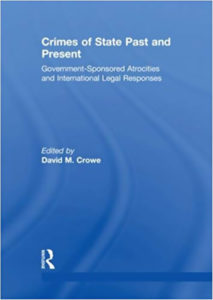
Crimes of states past and present: government-sponsored atrocities and international legal responses
David M. Crowe
Routledge (2011)
Rs13,741
War Crimes and acts of genocide are as old as history itself, but particularly during the 20th century. Yet what are war crimes and acts of genocide? And why did it take the world so long to define these crimes and develop legal institutions to bring to justice individuals and nations responsible such crimes? Part of the answer lies in the nature of the major wars fought in the 20th century and in the changing nature of warfare itself.
This study looks at war crimes committed during the Second World War in the USSR, Yugoslavia, Germany, and efforts to bring the perpetrators to justice. This led to successful postwar efforts to define and outlaw such crimes and, more recently, the creation of two international courts to bring war criminals to justice. This did not prevent the commitment of war crimes and acts of genocide throughout the world, particularly in Asia and Africa. And while efforts to bring war criminals to justice has been enhanced by the work of these courts, the problems associated with civil wars, command responsibility, and other issues have created new challenges for the international legal community in terms of the successful adjudication of such crimes.
This book was based on a special issue of Nationalities Papers.
David M. Crowe is a professor of history at Elon University and a professor of legal history at Elon University’s School of Law. He is President Emeritus of the Association for the Study of Nationalities at Columbia where he has also served as a Visiting Scholar. He has taught at Central European University and has been a Fellow at the Center for Slavic, Eurasia, and East European Center at the University of North Carolina at Chapel Hill. He has also been a member of the Education Committee of the United States Holocaust Memorial Museum in Washington, D.C. and has served as chair of the North Carolina Council on the Holocaust. He has testified before the United States Congressâe(tm) Commission on Security and Cooperation in Europe and the New York City Councilâe(tm)s Subcommittee on Immigration. He currently serves on the Editorial Boards of Nationalities Papers, Ethnopolitics, and First World War Studies.
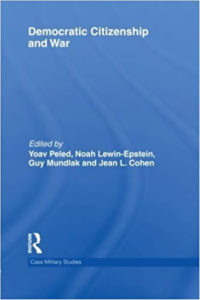
Democratic Citizenship and War
Yoav Peled
Routledge (2011)
Rs14,658
This edited volume explores the theoretical and practical implications of war and terror situations for citizenship in democratic states.
Citizenship is a key concept in Western political thought for defining the individualâe(tm)s relations with society. The specific nature of these rights, duties and contributions, as well the relations between them, are determined by the citizenship discourses that prevail in each society.
In wartime, including low-intensity wars, democratic societies face different challenges than the ones facing them during peacetime, in areas such as human rights, the status of minorities, the stateâe(tm)s obligations to its citizens, and the meaning of social solidarity. War situations can affect not only the scope of citizenship as an institution, but also the relations between the prevailing discourses of citizenship and between different groups of citizens. Since 9/11 and the declaration of the ‘war on terror’, many democracies have been grappling with issues rising out of the interface between citizenship and war. This volume examines the effects of war on various aspects of citizenship practice, including: immigration and naturalization, the welfare state, individual liberties, gender relations, multiculturalism, social solidarity, and state âe” civil society relations.
This book will be of great interest to students of military studies, political science, IR and security studies in general.
Yoav Peled is a professor of Political Science at Tel Aviv University.
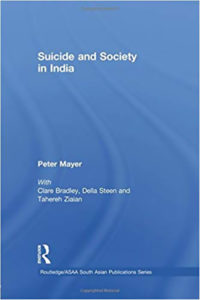
Suicide and Society in India
Peter Mayer
Routledge (2011)
Rs15,574
In India about 123,000 people take their own lives each year, the second highest total in the world. There is a suicide death in India almost every 4 minutes, and it is the leading cause of death for rural Indians especially women in early adulthood. This book presents a comprehensive analysis of suicide in India based on original research as well as existing studies, and looks at the issue in an international, sociological and historical context.
The author looks at the reliability of suicide data in India, and goes on to discuss various factors relating to suicide, including age, gender, education and marriage. Among its findings, the book exposes a hidden youth suicide ‘crisis’ in India which is argued to be far more serious than the better known crisis of farmer suicides. The book dispels many myths that are commonly associated with suicide, and highlights a neglected public health problem. Suicide in the region of Pondicherry is looked at in detail, as well as in the Indian Diaspora. This book is a useful contribution to South Asian Studies, as well as studies in Mental Health and Sociology.
Peter Mayer is an associate professor of politics at the University of Adelaide. His research interests include suicide in India; the privatisation of state-owned enterprises; the masculinisation of the Indian population; civic engagement and social capital in human development and state weakness in South Asia. He is series editor for the Routledge/ASAA South Asian Series.
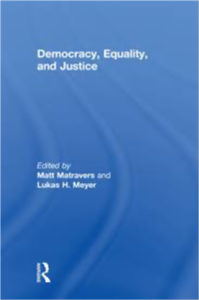
Democracy, Equality, and Justice
Edited by Matt Matravers, Lukas H. Meyer
Routledge (2011)
Rs15,574
In addressing democracy, equality, and justice together, the book stimulates discussions that go beyond the sometimes increasingly technical and increasingly discrete literatures that now dominate the study of each concept. The chapters fall into four categories: on justice and democracy; justice and equality; justice and community; and justice and the future. Concerns of justice unite all the chapters in this volume. However, these concerns now manifest themselves in interesting and new directions. Politically, the book confronts urgent problems of democracy, equality, community, and of how to respond to potentially catastrophic climate change. The response to these problems cannot only be pragmatic and piecemeal. What emerges are a number of interlinking questions and themes that together constitute the central core of contemporary political philosophy.
Matt Matravers is a professor of Political Philosophy at the University of York. He is the author of Justice and Punishment (Oxford University Press, 2000) and Responsibility and Justice (Polity Press, 2007) as well as of numerous articles and chapters on political and legal philosophy.
Lukas H. Meyer is a professor of Practical Philosophy, University of Berne. He is the author of Historische Gerechtigkeit (de Gruyter, 2005), editor of Intergenerational Justice (Oxford University Press, 2009) and Legitimacy, Justice and Public International Law (Cambridge University Press, 2009), as well as of numerous articles and chapters on political and legal philosophy.
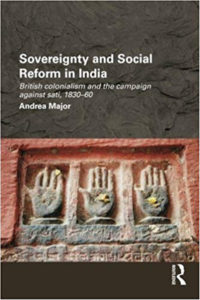
Sovereignty and Social Reform in India: British Colonialism and the Campaign Against Sati
Andrea Major
Routledge (2011)
Rs13,741
The British prohibition of sati (the funeral practice of widow immolation) in 1829 has been considered an archetypal example of colonial social reform. It was not the end of the story, however, as between 1830 and 1860, British East India Company officials engaged in a debate with the Indian rulers of the Rajput and Maratha princely states of North West India about the prohibition and suppression of sati in their territories. This book examines the debates that brought about legislation in these areas, arguing that they were instrumental in setting the terms of post-colonial debates about sati, and more generally, in defining the parameters of British involvement in Indian social and religious issues.
This book provides a reinterpretation of the major themes of sovereignty, authority and social reform in colonial South Asian history by examining the shifting pragmatic, political, moral and ideological forces which underpinned British policies on and attitudes to sati. The author illuminates the complex ways in which East India Company officials negotiated the limits of their own authority in India, their conceptions of nature and the extent of Indian princely sovereignty, and argues that and the so-called âe~civilising missionâe(tm) was often dependent on local circumstances and political expediencies rather than overarching imperial principles; the book also evaluates Indian responses to the supposed modernising Enlightenment discourse.
This book will be of great interest to students and scholars of South Asian history as well as British colonial studies.
Andrea Major is a lecturer in Wider World History at the University of Leeds, where she works on social and gender issues in colonial South Asia. She is author of Pious Flames: European Encounters with Sati, 1500-1830 (Oxford University Press, New Delhi, 2006) and editor of Sati: A Historical Anthology (Oxford University Press, New Delhi, 2007).

